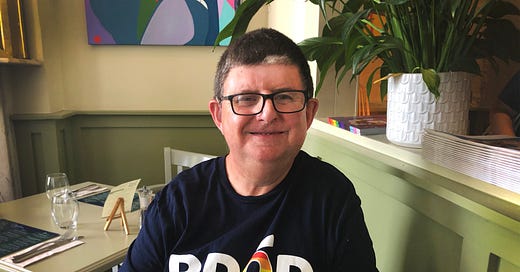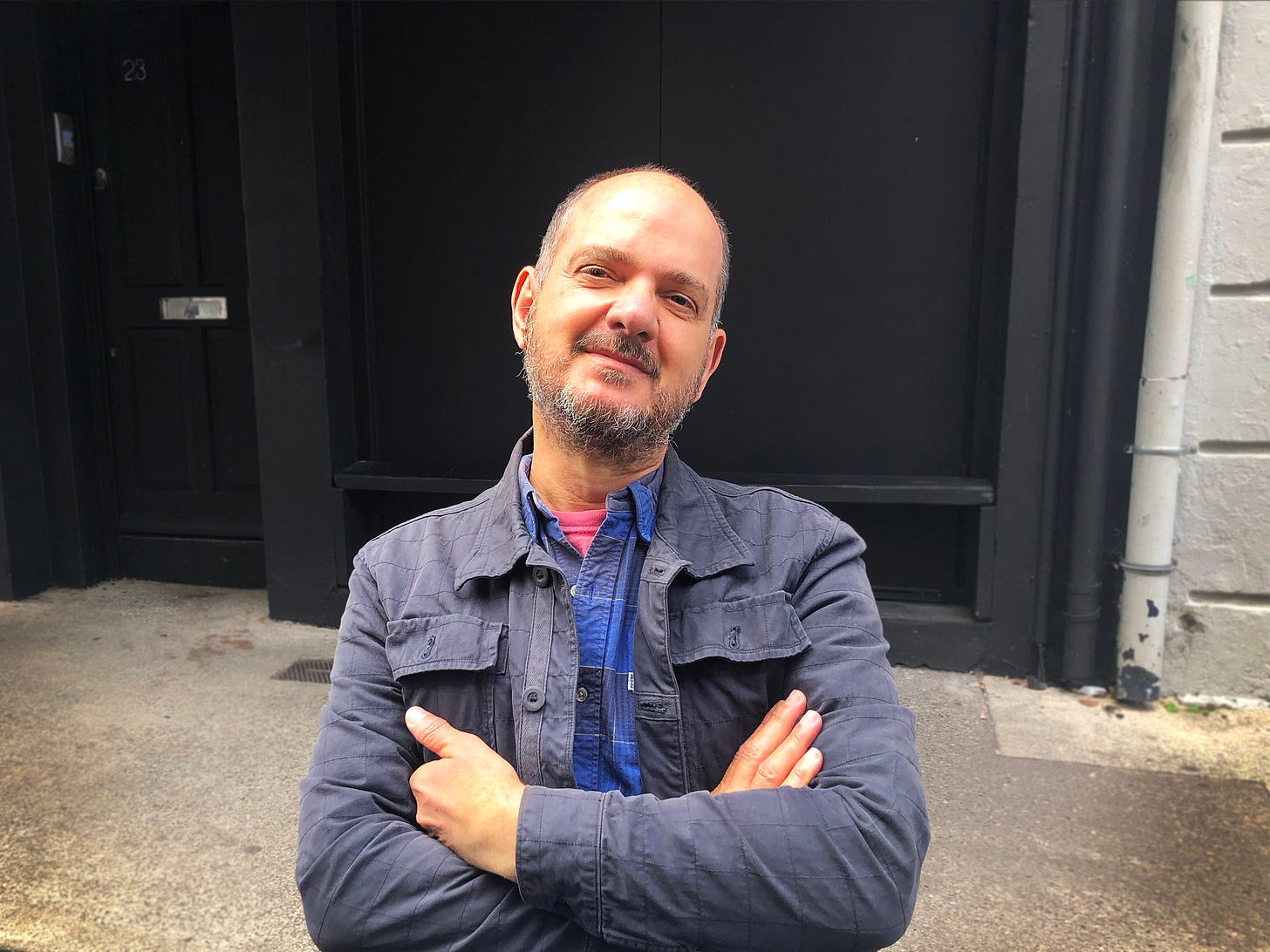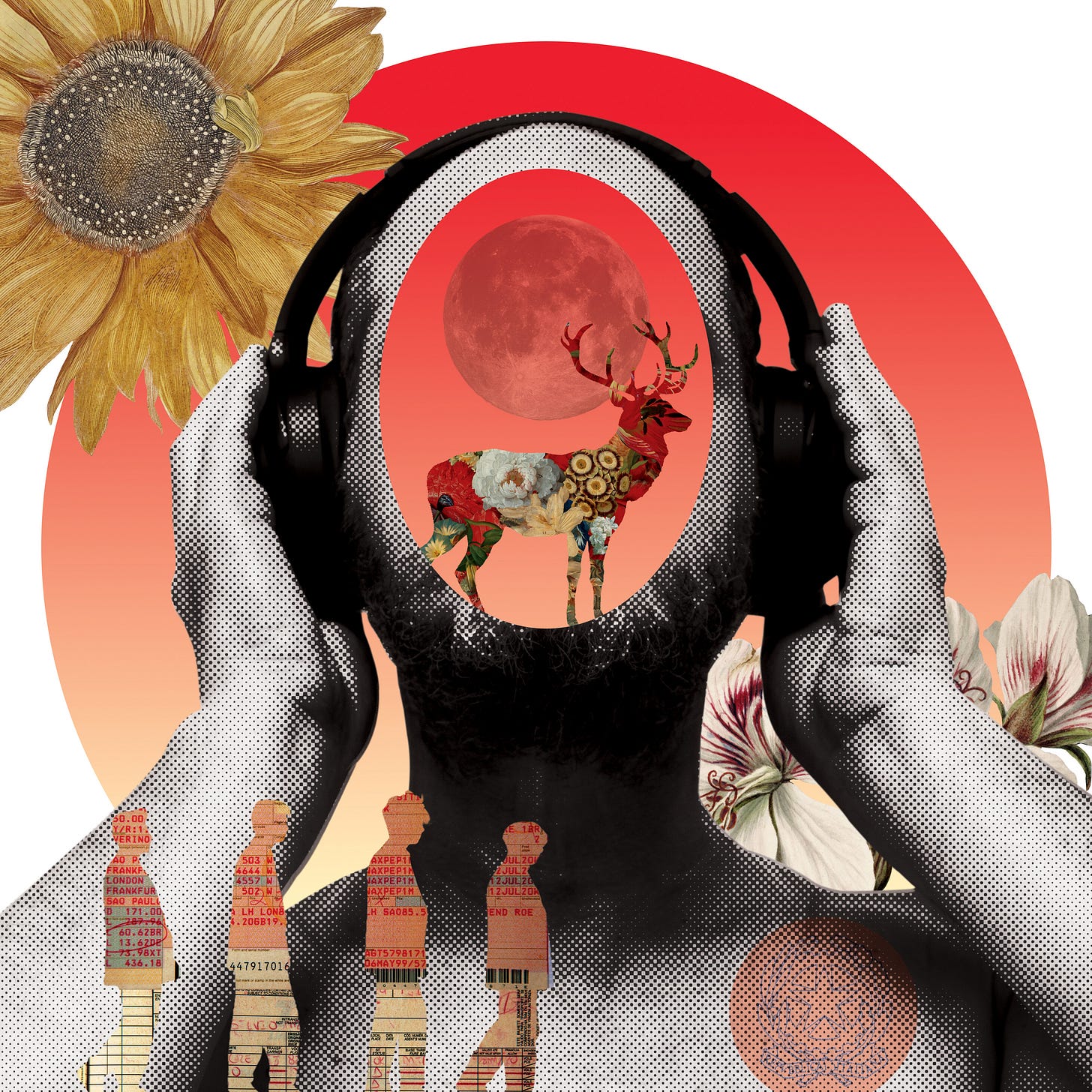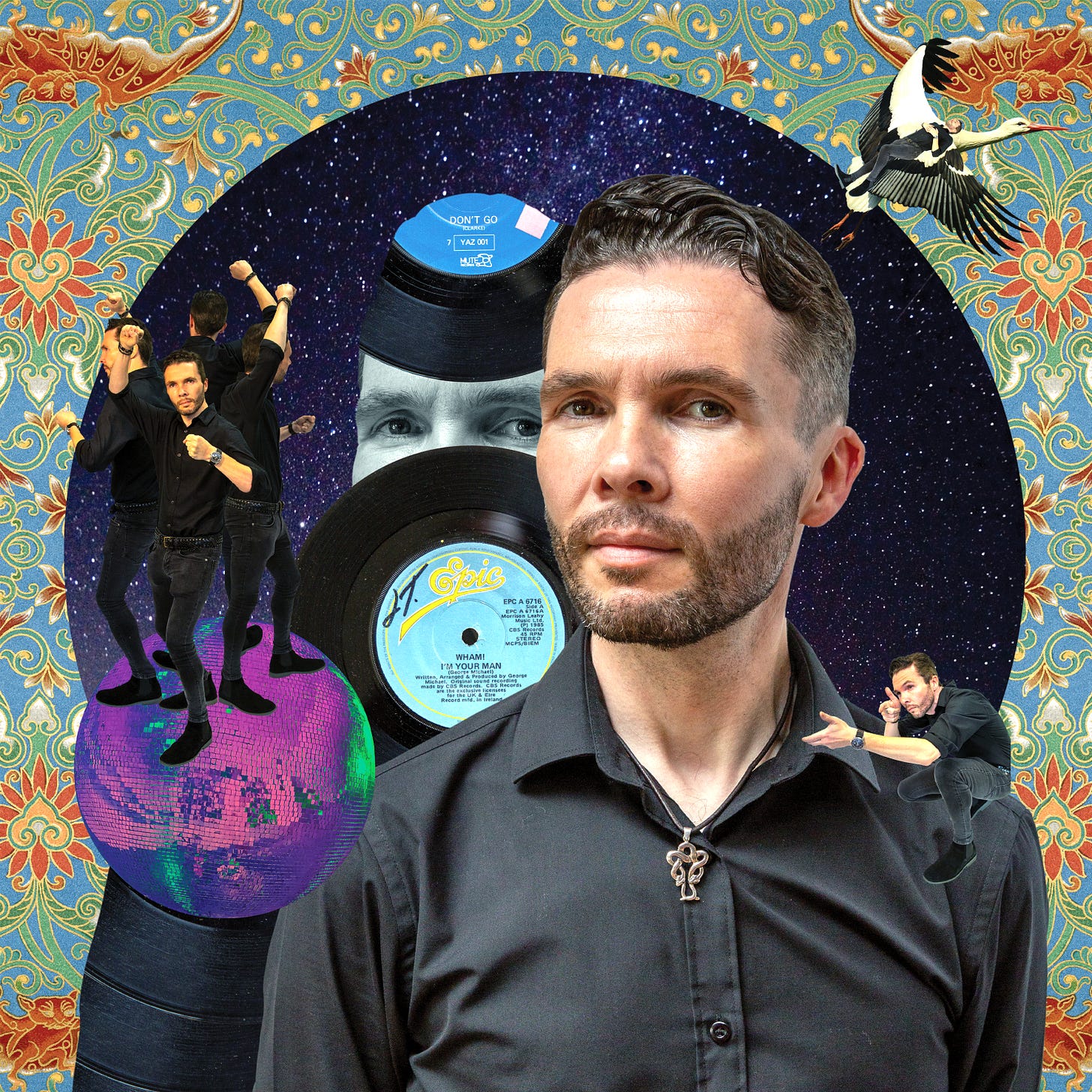In their own words: Before the Rainbow
A new book and film arts project explores the experience of older gay men; three participants tell Tripe + Drisheen about living through decades of change.
A collaborative art project for older gay men
Before The Rainbow….And After is a collaborative art project involving ten older LGBT men, working with arts facilitator and theatre director Mark Storor in Cork’s Gay Project on Sawmill St, in a two-month process involving photography, collage, movement, film and more.
Mark Storor is known for his work with common interest groups as varied as kidney dialysis patients, former military personnel and refugee women.
“The men who have been involved in this project are also men who feel like the 'lost generation,’” Mark said of the project.
“The cohort who suffered the indignity of criminalisation due to their sexuality. Men who lived through the AIDS epidemic, lost friends, family and lovers to the disease, fought for gay rights and marriage equality and who have brought about change that the entire community is benefiting from but who many of the younger generation don’t understand or realise what they've been through.”
Three of the project’s participants sat down with Tripe + Drisheen to talk about their lives, challenges and experiences.
David “Bunty” McCarthy
David, or Bunty, as he has been known for years in Cork, 61, retired in 2020, after 40 years working for An Post. He grew up in the Lough Parish and lives near Togher.
Coming out
“I didn’t come out to anyone; I was hidden for years. My family were very slow to accept me as being gay. They didn’t understand. My mother is 89 now, and she doesn’t really talk about it, but she knows I’m gay.”
“I was looking for friendship; I could have been looking for a boyfriend too, but I knew my family would disown me if I ever did that. Now things are very different. Up until 1990 and Mary Robinson and David Norris, things were very different. Now it’s 30 years since decriminalisation of homosexuality. When the law changed I was delighted, because people couldn’t discriminate against me anymore.”
The Cork scene
“From the gay scene back in the eighties, I got given the nickname Bunty and everyone still calls me that; a lot of people on the gay scene don’t even know my real name.”
“Way back in 1980 it was a terrible time; you had to hide everything. In the late seventies, on McCurtain street, there was a door next to the Irish Times office and there was a hidden nightclub there. We were hidden in the Quay Co-op, until Arthur Leahy founded The Other Place, when I was about 19. We had a bar upstairs and a nice dance floor downstairs.”
“The Other Place closed in the nineties. Loafers, which opened in 1983, was the first gay pub in Cork. I remember I was working as a postman at the time, and I was going down Douglas St and the door of Loafers opened up, and I went in for a look, and they told me I was the first person to walk through the doors. I think there’s a need for another gay pub in Cork now.”
Experiences of homophobia
“I did experience abuse on the gay scene. I used to take people home and get beaten up. The Gardaí at the time didn’t want to know because they didn’t seem to know the law themselves at the time. I ended up in hospital once. But I kept going. I didn’t care. My name is not failure; I keep going. When homosexuality in Ireland was hidden, in the eighties, I used to go to Blackpool in England, where you could stay in a gay hotel. You’d have a great weekend and then you’d come back to Ireland and everything was hush-hush.”
Advice to my younger self
“Don’t bundle up your feelings. Express them, get them out. You’re bound to get a yes or no answer. You’re not going to get answers right away. If you go to your parents and say, ‘I’m gay,’ don’t get downhearted if they don’t talk to you about it straight away. They might need time to think about it and to adjust. Life is short, and it’s for living, and at the end of the day, we’ll all end up in the same place.”
On Ageing
“I’ll be 62 in November but I’m still going out. Now I go to Chambers, because Loafers is gone, and other places have gone too, over the years.”
“I never feel lonely, you just carry on. We have a golden oldies group that meets up on Fridays in the Gay Project. People turn up for coffee to discuss everything. When I retired in 2020 there was Covid, so I couldn’t do much. It’s only now I’m getting back to normal and we’re meeting up to go to the cinema and things like that.”
“I worked for An Post for 40 years. I was a postman first, and then I moved inside and I was sorting mail in Little Island. Sometimes I feel like I want to go back to work, but I worked six nights a week for 25 years.”
Working on the Before The Rainbow project
“We did about nine weeks, and some of us met individually with Mark. I hadn’t a clue what I was taking on. At the start it was a bit difficult but I said to myself, ‘you can leave now or you can keep going. You’re not made for failure.’ Mark, the facilitator, made us feel like a happy family. We had to draw things and I drew a rocket and coloured it in: I said, ‘I’m going to space to find a new world and to open up to everybody.’ Then I drew a mountain, and I’m on it, with my hands up in the air: I’m talking to the world, telling them, ‘I’m gay. I’m free.’”
“Mark was like an art therapist. He was teaching us to take all our emotions and stop bundling them up because it’s no good for your heart.”
“My whole body has loosened up and I’m a much happier person since the project. I was always afraid who might be around the corner, or the neighbours didn’t know about me. For the first time this year, I put a big rainbow flag outside my house for Pride week.”
Silvio Severino
Silvio, 59, is a photographer and collage artist who is originally from Brazil, but who has lived in Europe for the past 20 years. He moved to Cork five years ago with his partner, Pascal, who is Swiss. He lives near the city centre.
Coming out
“I didn’t move to Europe to be openly gay because I was that already in Brazil, but for my generation, even when you were out, you didn’t want everyone to know; maybe your friends know but your family doesn’t, or your family knows but your work doesn’t. That was very common.”
“At one point, I think I just realised there was nothing wrong with me. You hear all these bad stories, all these bad words, when you are young, and you associate with them all in a negative way. Then you realise there’s nothing wrong with you. I had some conflict with my mother in the beginning, but they did accept it. I think I was eighteen or nineteen.”
The Cork scene
“I lived in Brussels for one year and before that, I lived in Budapest for five years, and before that I was living in London for seven years. Before that, Zurich, because my partner is from Switzerland, but we met in London before that.
“I moved from Brazil to London just before the millennium, in 1999. I was in my thirties, and it was exciting times, because before then I was born and lived in the same place all my life, Porto Alegre in the deep south of Brazil. I was not happy with my life there. You have to remember that there was a military dictatorship in Brazil for many years; there was no freedom of expression, freedom of the press, nothing. It was a very conservative society.”
“London, for the music, and the culture, seemed like where I should go. I had worked in record shops in Brazil, but in London, I did different jobs: cleaning, delivering newspapers, doing flyers for discos in the evening. I met my partner and we fell in love; it was 23 years ago.”
“I really like it in Cork. I haven’t had any bad experiences here, not as a gay man, not as a foreigner. I think we’ll stay in Cork; I like it a lot, I like the fact that I can walk into the city centre in 15 minutes. Big cities like London, I don’t think I can do any more."
Experiences of homophobia
“I never had much experience of homophobia but probably because I was so quiet. I was a very shy person, very afraid about the world. Brazilian culture is very extrovert. Everybody is loud, everyone is talking, everyone wants attention. I come from a big family and have five sisters. I was always very quiet, and I was bullied a lot but I never responded because I wasn’t very good at fighting. I didn’t have much sexual experience up until a certain age, anyway. It was a slow process of discovering how to put myself out into the world.”
“For the video for this project, we got balloons and we wrote the bad things that people call you. Then we burst the balloons for the video. I wrote things in Portuguese; I wrote Veado, which is like Faggot, a very bad word, that also translates as deer, like the stag in my collage. It was intense.”
Advice to my younger self
“What I would tell me is the same as what some people did tell me, but I didn’t listen much because I was too involved in myself. Just, ‘don’t worry. Everything will be ok. Just take everything as a learning and you’re going to be ok. One day, you won’t feel bad about yourself.’”
On Ageing
“Before, you couldn’t live with someone in an affectionate and loving relationship. You were going to get old, and who was going to take care of you? But not everyone is lucky enough to get old and have their sons and daughters look after them anyway; doesn’t that happen all the time?”
“The group of friends I have, a lot of them are single, but someone from the project said he was very happy to be single, to have his own life. I’m very happy to be in a relationship but it’s not true that to be happy you need someone; some people are alone by choice and that’s fine for them.”
“I love to be a middle-aged man. I feel so much better now. There’s been a whole process to get here, but I feel much freer and better than before.”
Working on the Before The Rainbow project
“There’s a group for middle-aged and older guys at the Gay Project. One day, when I came in, Mark was there explaining the whole project. I wasn’t sure because I didn’t know if I’d have time, and also my participation was in two ways. I was the one who was making the artworks for all the participants, but I was also one of the group who was meeting and doing workshops, so I was both inside and outside the project.”
“I do photography, but now I am more interested in collage and I’m very involved in the collage community and festivals. I like collage because it gives me all sorts of possibilities: to deconstruct, to use different materials.”
“It was interesting to be in a group that was more or less the same generation because I might be from a different country and culture, but the oppression and everything was all quite similar. Of course, if you go to Rio you’ll think it’s all liberal with people smoking joints and gay guys, but the deep south of Brazil, where I’m from, has a very typical macho culture.”
“Being one of the guys and doing the workshops and discovering things about me and learning about the other people was really interesting, but at the same time I had to keep focusing on listening, on what I was going to put in the collages. When I was photographing the other men, I asked them to bring objects that have meaning in their lives to put in the collage.”
“For my own collage, one of the things I put in was my aeroplane tickets, from Porto Alegro to São Paulo to London. And the other thing is a stag, in my head, that I beautified.”
Lindley Walsh
Lindley, 48, comes from Carrignavar; as a DJ, he was a regular, with a residency in Cubin’s nightclub, on the straight club scene for many years. He came out as gay two years ago, at 46, following a health scare.
Coming out
“I knew I was gay, and had known since I was about seven or eight. I tried to come out at 14 or 15, and it was made very clear to me that it wouldn’t be accepted. Things were tough with my father. It was pretty awful. I just went back into my shell; I was into music from a young age, my mother’s disco records, Boney M and all that stuff.”
“I had to keep it buried, so I got lost in the whole straight club scene. But I was pretending to be something I wasn’t. I even had relationships with women. I was deeply unhappy and I was drinking a lot.”
“In August 2020, I collapsed. I’d had a brain haemorrhage. In hospital, they thought I had brain cancer because of the shadowing on the brain. I was scheduled for surgery, but they sent me for a third MRI and no, I didn’t have cancer. It was a bleed.”
“When I was in hospital, I fancied one of the day care guys. And I just thought, ‘enough of this; I’m sick of this, it’s time.’ I was 46.”
“I told my mother first and she apparently knew nothing. Then I told work. My aunt said, ‘you don’t need to tell me anything, what difference will it make?’”
“I came to the Gay Project and got deeply involved, and even my age has made no difference because I seem to be able to fit in with different ages. 30-year-olds don’t seem to see me as an old fart. My boyfriend is much younger than me. I’m in a relationship now, I’ve been involved with DJing for Pride. I’ve gotten involved with art projects and different things, and it’s fantastic. I’ve never been happier.”
The Cork scene
“I started DJing in Cubins in 1992. I was buying vinyl from an early age and I was in Mangan’s nightclub and I looked at the DJ and thought, ‘he’s here every week.’ So I went up to him and said, ‘if you’re looking for somebody…’ I went off and got a night down in De Barra’s because they had the equipment, just for the experience, and within a week of giving the Mangan’s DJ my number, he gave me a call. So I was doing an over 23s nightclub at 17.”
“There used to be a variety of venues and places to go in Cork, before all this corporate stuff. There was a real identity, a strong identity.”
Experiences of homophobia
“All the heavy lifting was done by an older generation, under very hostile conditions. Pride has now become a branded holiday. I’m glad to be involved in Pride, and I hear the school of thought that says corporate endorsement is real acceptance, but those companies wouldn’t be touching it unless it made money for them. It’s PR for them; they don’t give a fuck about the gay community, let’s be honest. It’s ticking boxes.”
Advice to my younger self
“When I was growing up, seeing AIDS and that awful ad of the tombstone with John Hurt’s voice was very frightening. I remember Rock Hudson died in 1985 and the shock about that, but what had more of an affect on me was Vincent Hanley, who died in 1987. I watched MT-USA as a kid. It was a huge thing, that he died of AIDS.”
“There was a lot of gay identity from music, and that was important to me. You had The Communards, Bronski Beat, Erasure, Boy George. I was drawn to all of that. I was so different; I didn’t fit in at all.”
“Could I have come out earlier? I’m not sure. I think I would have been kicked out. I always kept myself to myself. You are isolated. The church was very strong and where I come from, in Carrignavar, it is provincial. It’s the Valley of the Squinting Windows.”
On Ageing
“Probably because people are more educated and liberal now and voting patterns are changing, the power of the Catholic church is fading. It has been since the late eighties and early nineties: When I was in school I could see it happening.”
“I look at the older community now, and my observance is that a lot of them are deeply lonely. Whether they have houses, careers, whatever, they’re lonely. And some of them are filling that void with Grindr, which is such superficiality. It’s not even a dating app: it’s just for sex, let’s be honest. But you could have 20 guys going through your bedroom every week and that’s not going to make a difference when you’re alone at one or two in the morning.”
“Grindr is very prejudiced itself, and there’s a whole subculture of discrimination within the gay community. It’s not a bed of roses. I tried it, and Iasted two weeks. You need to be able to go and talk and sit across from someone and find out if there’s a connection. That’s how I met my boyfriend: it worked for me.”
“You need a community that’s your surrogate family, where if someone doesn’t show up, someone will miss them. Its gone from Loafers and stuff to Grindr, which is completely empty.”
Working on the Before The Rainbow project
“I thought I’d be interested in an art project because I’m interested in art and antiques. It was great, because you’re finding your expression within the group. There are a lot of sports clubs and activities at the Gay Project but it was great for more artistic people to be able to find their level and to work with Mark.”
“In a way, the project transported you back to a certain time in Ireland that was deeply hostile and deeply hypocritical and that can make you very angry. There were similar narratives coming from a lot of the older men on the project that were very familiar.”
Before the Rainbow…..and After will have an invite-only launch in Cork City Centre on Monday, August 29. The art book will be available from selected outlets and the short film of the project will be available on Gay Project’s website from August 30.









Great article